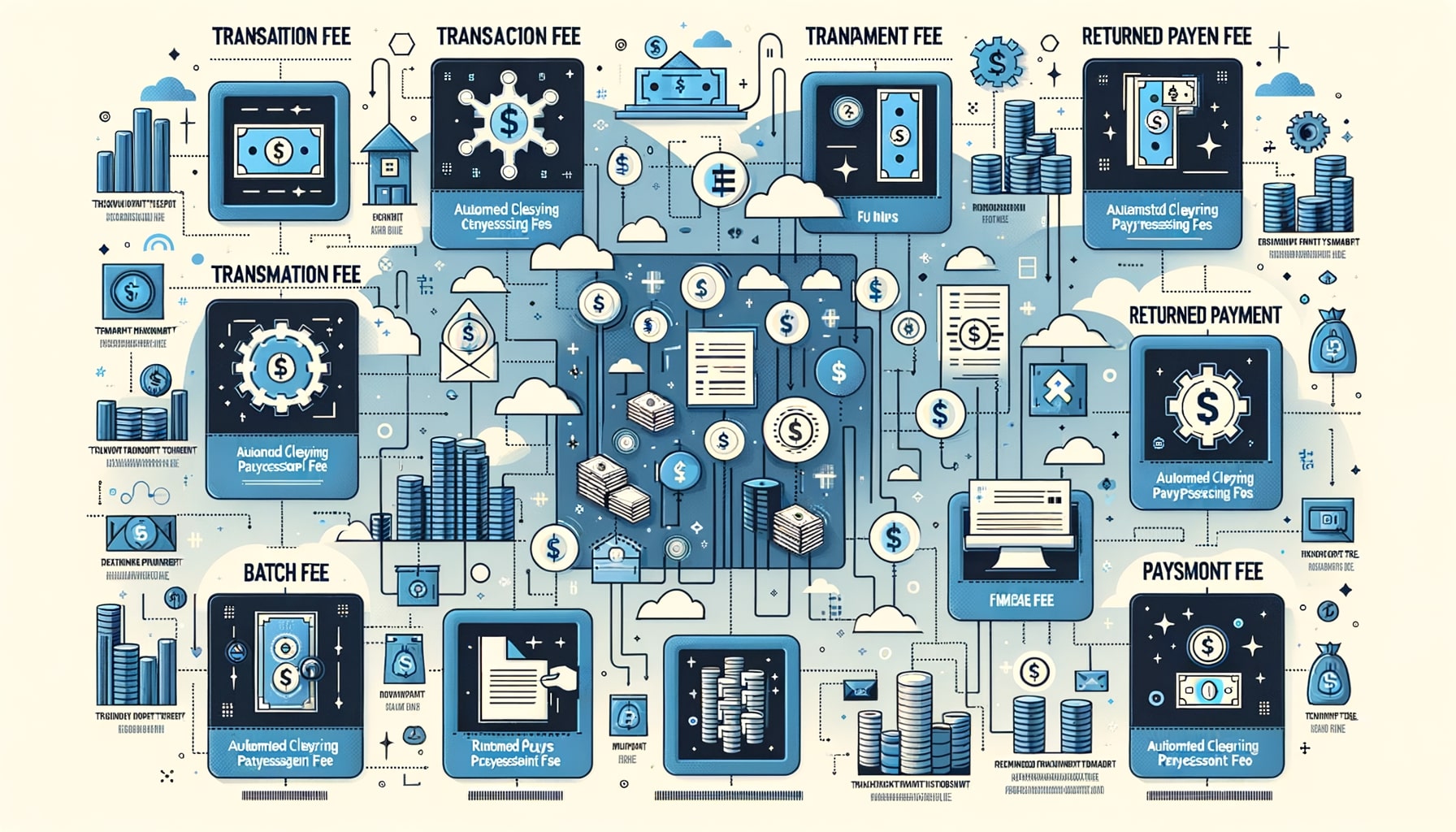
By alphacardprocess October 18, 2024
In today’s digital age, electronic payment methods have become increasingly popular, offering convenience and efficiency for businesses across various industries. One such method is ACH (Automated Clearing House) payment processing, which allows for the transfer of funds between bank accounts electronically. For construction businesses, ACH payment processing can streamline financial transactions, improve cash flow, and enhance overall operational efficiency. However, it is essential to understand the associated fees and costs to make informed decisions.
In this article, we will delve into the world of ACH payment processing fees for construction businesses, exploring the factors influencing these fees, comparing providers, understanding different types of fees, and providing tips for negotiating fees.
Understanding ACH Payment Processing: What You Need to Know
Before diving into the intricacies of ACH payment processing fees, it is crucial to have a solid understanding of how ACH payment processing works. ACH is an electronic network that facilitates the transfer of funds between bank accounts. It allows businesses to initiate payments or receive funds directly from their customers’ bank accounts, eliminating the need for paper checks or credit card transactions.
ACH payments are typically used for recurring payments, such as payroll, vendor payments, and customer billing. The process involves the construction business initiating a payment request through an ACH payment processor, which then transfers the funds from the customer’s bank account to the business’s account. This process is secure, efficient, and cost-effective compared to traditional payment methods.
How ACH Payments Work in the Construction Industry
In the construction industry, financial transactions often involve high-value payments and multiple parties, such as clients, suppliers, subcontractors, and project managers. ACH payments streamline these transactions by eliminating the need for paper checks, reducing delays, and offering a secure and automated method for transferring funds.
For example, a general contractor might use ACH payments to send weekly payments to subcontractors or receive milestone payments from clients. Instead of waiting for a check to clear, the funds are electronically transferred between bank accounts within 1-3 business days, ensuring that projects move forward without payment bottlenecks.
Factors Influencing ACH Payment Processing Fees for Construction Businesses

Several factors influence the ACH payment processing fees that construction businesses incur. Understanding these factors can help businesses make informed decisions when selecting a payment processor and negotiating fees. Here are some key factors to consider:
- Transaction Volume: The number of ACH transactions processed by a construction business plays a significant role in determining the fees. Higher transaction volumes often result in lower fees per transaction due to economies of scale.
- Transaction Amount: The size of each ACH transaction can impact the fees. Some payment processors charge a flat fee per transaction, while others charge a percentage of the transaction amount. Construction businesses should consider their average transaction size and choose a payment processor with fees that align with their transaction amounts.
- Payment Frequency: The frequency at which a construction business processes ACH payments can affect the fees. Some payment processors offer discounted rates for businesses with higher payment frequencies, while others charge a flat fee regardless of the frequency.
- Payment Processing Provider: Different payment processing providers offer varying fee structures and pricing models. It is essential for construction businesses to compare providers and choose the one that offers competitive rates and transparent fee structures.
- Additional Services: Some payment processors offer additional services, such as fraud prevention tools, reporting capabilities, and integration with accounting software. These value-added services may come at an additional cost, impacting the overall fees.
Comparing ACH Payment Processing Providers: Key Considerations

When selecting an ACH payment processing provider for a construction business, it is crucial to consider several key factors beyond just the fees. Here are some considerations to keep in mind:
- Reputation and Reliability: Choose a payment processor with a solid reputation and a track record of reliability. Look for reviews, testimonials, and case studies to gauge the provider’s performance and customer satisfaction.
- Security Measures: Ensure that the payment processor has robust security measures in place to protect sensitive financial information. Look for providers that comply with industry standards, such as PCI DSS (Payment Card Industry Data Security Standard).
- Integration Capabilities: Consider the payment processor’s ability to integrate with your existing accounting software or other systems. Seamless integration can streamline operations and reduce manual data entry.
- Customer Support: Evaluate the level of customer support provided by the payment processor. Responsive and knowledgeable support can be invaluable when dealing with any issues or inquiries.
- Reporting and Analytics: Look for payment processors that offer comprehensive reporting and analytics tools. These features can provide valuable insights into your business’s financial performance and help identify areas for improvement.
Exploring Different Types of ACH Payment Processing Fees

ACH payment processing fees can vary depending on the payment processor and the specific services offered. It is essential to understand the different types of fees to accurately assess the overall cost. Here are some common types of ACH payment processing fees:
- Setup or Application Fees: Some payment processors charge a one-time setup or application fee to get started with their services. This fee covers the administrative costs associated with onboarding a new customer.
- Monthly or Annual Fees: Many payment processors charge a recurring monthly or annual fee for their services. This fee covers the ongoing maintenance and support provided by the payment processor.
- Per-Transaction Fees: Per-transaction fees are charged for each ACH transaction processed. These fees can be a flat rate per transaction or a percentage of the transaction amount. Construction businesses should consider their transaction volume and average transaction size to assess the impact of per-transaction fees.
- Return or Rejection Fees: If an ACH transaction is returned or rejected due to insufficient funds or other reasons, payment processors may charge a return or rejection fee. These fees cover the administrative costs associated with handling failed transactions.
- Batch Fees: ACH transactions are often processed in batches, where multiple transactions are grouped together for efficiency. Some payment processors charge a batch fee for each batch of transactions processed.
- ACH Network Fees: The ACH network itself imposes fees for processing transactions. These fees are typically passed on to the businesses using ACH payment processing services. The ACH network fees can vary based on the transaction volume and the type of transaction.
Tips for Negotiating ACH Payment Processing Fees for Construction Businesses

Negotiating ACH payment processing fees can help construction businesses secure more favorable rates and reduce overall costs. Here are some tips for negotiating fees:
- Research and Compare: Before entering into negotiations, thoroughly research and compare different payment processors. Understand their fee structures, pricing models, and the services they offer. This knowledge will give you leverage during negotiations.
- Highlight Transaction Volume: If your construction business processes a high volume of ACH transactions, emphasize this during negotiations. Higher transaction volumes often warrant lower fees per transaction due to economies of scale.
- Bundle Services: Consider bundling multiple services with a single payment processor. By consolidating your payment processing needs, you may be able to negotiate better rates and discounts.
- Leverage Competition: Use the competitive landscape to your advantage. If you have received quotes from multiple payment processors, share this information during negotiations. Providers may be willing to match or beat their competitors’ rates to win your business.
- Long-Term Commitments: Some payment processors offer discounted rates for businesses willing to commit to long-term contracts. If you are confident in the services provided by a particular provider, consider negotiating a longer-term agreement to secure better rates.
- Seek Customized Solutions: Discuss your specific business needs and requirements with the payment processor. They may be able to offer customized solutions or pricing structures tailored to your construction business, potentially reducing fees.
FAQs
Q1: What is the average ACH payment processing fee for construction businesses?
The average ACH payment processing fee for construction businesses ranges from $0.20 to $1.50 per transaction, depending on the payment processor and the type of transaction.
Q2: How can construction businesses reduce ACH payment fees?
Construction businesses can reduce ACH payment fees by selecting a payment processor that offers low fees for high-volume transactions, negotiating better rates, and using standard ACH processing rather than same-day ACH when possible.
Q3: Are ACH payments secure for construction businesses?
Yes, ACH payments are secure and regulated by the National Automated Clearing House Association (NACHA), which sets strict guidelines for fraud prevention, encryption, and data protection. ACH transactions are also processed through secure networks, reducing the risk of fraud compared to paper checks or cash payments. Businesses can further enhance security by working with payment processors that implement additional fraud detection tools and account verification processes.
Q4: How long do ACH payments take to process?
Standard ACH payments typically take 1-3 business days to process. However, with the option of same-day ACH, businesses can complete transactions on the same day, depending on the cutoff times and the payment processor’s capabilities. Construction businesses should weigh the urgency of the payment against the higher fees associated with same-day ACH.
Q5: Can ACH payments be reversed in case of error?
Yes, ACH payments can be reversed under certain conditions, such as duplicate transactions, processing errors, or fraudulent activity. However, reversals must typically be initiated within a specific time frame, often within a few business days. It is essential for construction businesses to work closely with their payment processor to address any issues promptly and ensure that proper procedures are followed.
Q6: Do ACH payments have transaction limits?
ACH payments may have transaction limits depending on the payment processor or bank being used. These limits can be daily, weekly, or monthly and may vary based on the volume or type of transactions. Construction businesses dealing with large transactions should confirm the limits with their payment processor and negotiate higher thresholds if necessary.
Conclusion
ACH payment processing fees are an important consideration for construction businesses looking to streamline their financial transactions. Understanding the factors influencing these fees, comparing payment processing providers, and exploring different types of fees can help businesses make informed decisions.
By negotiating fees and considering the overall value provided by the payment processor, construction businesses can optimize their payment processing operations and improve their bottom line. With the right payment processing partner and a clear understanding of the fees involved, construction businesses can enjoy the benefits of efficient and cost-effective ACH payment processing.